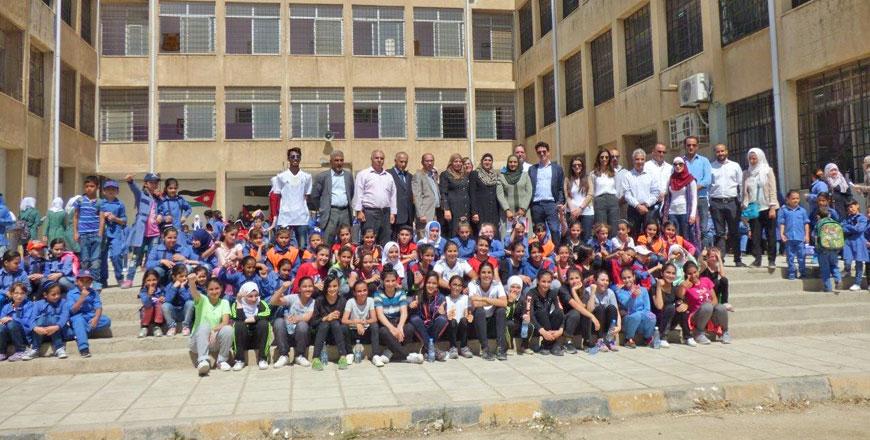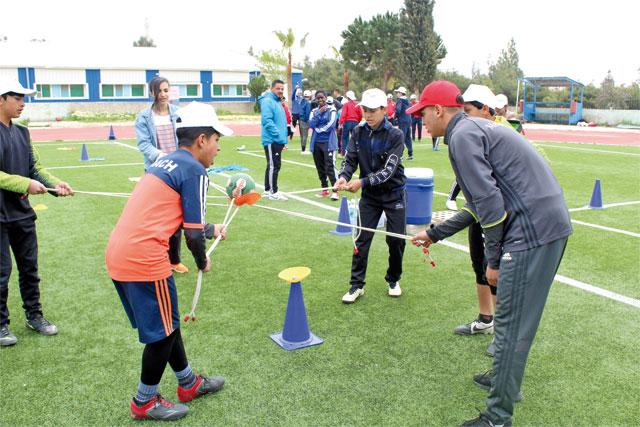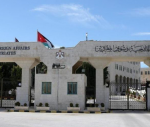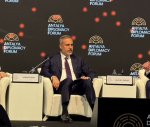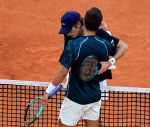You are here
Football project kicks off with goal of children’s development
By Felix Hackmann - Apr 11,2017 - Last updated at Apr 11,2017
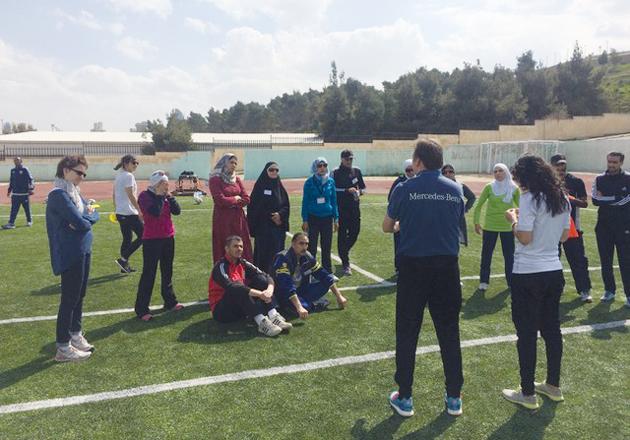
German football coaches display their training methodology in Amman Sports City recently (Photo by Felix Hackmann)
AMMAN — With the aim of improving children’s behavioural development, a German-Jordanian project is using football to harness the younger generation’s energy and curiosity.
“Once the ball starts to roll, only the rules of the game apply and the world around it is forgotten at the moment,” said Ulrich Klar, referencing German poet Friedrich Schiller’s quote. “Man only plays when he is in the fullest sense of the word a human being, and he is only fully a human being when he plays.”
For Klar, exchange adviser of the Sport for Development Centre in Amman, a project of the German Society for International Cooperation (GIZ) and the co-orgnaisers, this momentum, which children express through their curiosity and playfulness, is key to their development, and with it, the development of the country’s future.
For the organisers, football is the vehicle for combining play, education and children’s personal and behavioural development.
The GIZ has been working since 2007 to support and advise institutions and ministries around the world on the use of their natural and human resources.
For Jordan, one of its largest resources is the overwhelmingly young population. According to UNDP figures, 70 per cent of the Kingdom’s population is under 30 years old.
This youthful resource faces challenges to its growth and development within an education system which has been targeted with sweeping reforms.
Her Majesty Queen Rania spoke in February of how education in Jordan has “deteriorated” over the past decades, according to a statement from Her Majesty’s office, while a national strategy was launched in September of last year to carry out education reforms.
Within this difficult educational environment, many children demand a structured and well-planned framework to support the development of their potential.
This football-focused initiative seeks to provide such a framework, working for “grassroots” engagement throughout society, with a focus on children.
“The origin of this work lies in the 2010 World Cup, since there was a great interest in influencing sustainable development through sport”, said Henning Schick, head of the centre in the capital.
Through a five-year evaluation project, in cooperation with the University of Johannesburg, a methodology for using sport for children’s development has been developed.
Schick insists that the methodology works, while it has been successfully implemented in a pilot project in Colombia, as well as being used in Afghanistan and Brazil.
To ensure the success of the programme, funded by the German Federal Ministry of Economic Cooperation and Development, the GIZ is cooperating with the Asian Football Development Project and the German Football Association.
The GIZ organisers stress, however, that they are not here to impose western-centric teaching methods. Instead, they want to evaluate the situation, by asking Jordanians what they want their pupils to learn, by speaking to social workers and teachers, as well as by working together with Taiysir Mansi, associate professor at the Faculty of Physical Education at the University of Jordan.
Based on this analysis, education targets will be set in cooperation with their supporting partners and the Ministry of Education.
However, even if Jordanian partners express interest, the fundamentally different approaches to teaching could make the process of gaining ministry approval for the programme lengthy, organisers admitted.
The organisers also work directly in schools, where they seek to enhance the mutual respect and cooperation among pupils and teachers, Schick said.
Sports development programme in detail
The teaching methods that GIZ brings from Germany differ markedly from the often hierarchical, teacher-focused methods in many Jordanian schools, which can be characterised by repetitive-exercises and drills, German trainers said.
The core of the methodology, as it applies to football, is to play with different match scenarios, in exercise which ensure the immediate applicability of the learning to the game.
The relationship to the game and the applicability of the lessons should always be clearly recognisable to the learner, said Klar.
After an exercise has been presented, pupils collectively discuss and evaluate what has been learned and what is important. Afterwards, insights are immediately integrated into a match situation. This transfer of knowledge has an instantaneous effect and directly shows participants what they have achieved, he explains.
By examining the children physiologically, the training content is also adapted. At the same time, the importance of the children’s daily social environment is taken into account, with support on and off the field provided.
Off the field, the roles and responsibilities of the teachers are discussed, especially the unique challenges they face in their daily work.
As a result of the large numbers of Syrian refugees in the Kingdom, the teachers often face extreme situations.
School classes consist of 40 to 50 students, said Azaheer Zuhdi, a teacher at Aysha Um Al Mumeneen School in Jabal Al Hussein, adding that in some schools, Syrians students are integrated into the classes, while other schools rely on a so-called “doubleshift system”: Jordanian children are taught in the morning and Syrian children in the afternoon.
Both are a challenge for the teachers, but some pupils’ disrespect towards teachers is also a problem, teachers admitted.
In exchanges between the Jordanian teachers and the German coaches, possible difficulties are highlighted in order to find solutions together.
“After all, learning is always a process and we try to stabilise and guarantee its high standards”, said Schick, “assuring that the effect on programme participants will be measurable in three years”.
Related Articles
AMMAN — As a part of German Week 2017, the German Agency for International Cooperation (GIZ) on Monday organised an event titled “Special De
AMMAN — A pilot workshop of a three-year sports development project, initiated by the German federal ministry for economic cooperation and d
AMMAN — The German Agency for International Cooperation (GIZ) on Sunday held their Sport for Development programme at Sports City with 200 c


